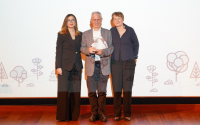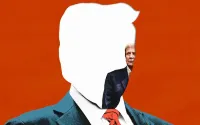23 July 2008Ian Traynor, Julian Borger, and Helena Smith
A new era in relations between Serbia and the west beckoned yesterday as Belgrade reaped rewards from the surprise arrest of Radovan Karadzic, the Bosnian genocide suspect, and pledged to apprehend the other most wanted alleged war criminal, General Ratko Mladic.
The strong signals from Serbia boosted the chances of full Balkan integration into the European mainstream after almost 20 years of nationalism, violence, war, isolation, and recalcitrance.
Serbia's new pro-western government won plaudits from Brussels and other western capitals yesterday and built momentum for the rapid inclusion of Serbia, the pivotal state in the Balkans, into European structures.
In Belgrade, a bizarre picture emerged of how Karadzic, who masterminded the 42-month siege of Sarajevo and is held politically responsible for the massacre of almost 8,000 Bosnian Muslims in July 1995, reinvented himself as a bearded New Age guru and devotee of alternative medicine living modestly in a Belgrade suburb and touring the country to deliver homilies on a better life.
On the run for 12 years after being indicted for war crimes in 1995, Karadzic was arrested by Serbian police on Monday evening while taking a bus in Belgrade, according to the Serbian government. His lawyer contested that scenario, saying his client was detained last Friday and had been held incommunicado and at an unknown location for three days.
Karadzic is expected to be transferred swiftly for trial to the war crimes tribunal for the former Yugoslavia in The Hague. Sources in Belgrade said he could be extradited as soon as Friday.
Vuk Jeremic, the Serbian foreign minister, told the Guardian his government was resolved to cement its new relationship with the EU by moving to arrest Mladic, also charged with genocide. He said Serbia would "cooperate fully" with tribunal, adding: "European integration is the utmost priority of this government. I think we have demonstrated that we are truly committed to international law."
Following the arrest, EU foreign ministers and officials called for Serbia to be put on the fast track to EU membership. "This is a very good thing for the rapprochement of Serbia with the European Union," said Bernard Kouchner of France, currently chairing the EU.
The European commissioner dealing with expanding the EU into the Balkans, Olli Rehn, called on the union to reward Belgrade immediately with trade benefits and an agreement that serves as a precursor to formal membership talks.
Serbia built on the pro-western message of the Karadzic arrest by stating that it would return ambassadors to EU countries that recognised the independence of the breakaway state of Kosovo in February. Serbia bitterly rejects western-backed Kosovo independence and the secession had made Serbia's relations with the west much more troubled.
Officials from the new Serbian government, only a fortnight in office, displayed pictures and provided details of the genocide suspect's new life, indicating Karadzic felt secure under the alias Dragan Dabic and under a cleverly disguised new identity. The exposure of Karadzic's secret life indirectly damned the previous nationalist government of Vojislav Kostunica, suggesting it could easily have arrested him.
Karadzic faces several charges of genocide, complicity in genocide, war crimes, and crimes against humanity for his leadership of the Serbian campaign of ethnic cleansing in Bosnia in the 1992-95 war which left 100,000 dead, 2 million mainly Bosnian Muslims uprooted, and a society destroyed.
The arrest is seen as the strongest possible signal that President Boris Tadic and his pro-western government are bent on joining the European mainstream. Since Slobodan Milosevic rose to power in Serbia, Belgrade has been at odds with the west. An attempt in 2003, after Milosevic was overthrown in 2000, to integrate with Europe was wrecked with the assassination of prime minister, Zoran Djindjic.
A senior Serbian official said it was "very likely" that Mladic was being sheltered by "fellow soldiers, a big network out there. But we are going to get to them, it is only a matter of time".
As of yesterday, there appeared to be relatively little resistance to the arrest from Serbia's ultra-nationalists. A few dozen demonstrators smashed some shop windows on Belgrade's Republic Square but were cleared within half an hour by a contingent of about 150 riot police.
A new era in relations between Serbia and the west beckoned yesterday as Belgrade reaped rewards from the surprise arrest of Radovan Karadzic, the Bosnian genocide suspect, and pledged to apprehend the other most wanted alleged war criminal, General Ratko Mladic.
The strong signals from Serbia boosted the chances of full Balkan integration into the European mainstream after almost 20 years of nationalism, violence, war, isolation, and recalcitrance.
Serbia's new pro-western government won plaudits from Brussels and other western capitals yesterday and built momentum for the rapid inclusion of Serbia, the pivotal state in the Balkans, into European structures.
In Belgrade, a bizarre picture emerged of how Karadzic, who masterminded the 42-month siege of Sarajevo and is held politically responsible for the massacre of almost 8,000 Bosnian Muslims in July 1995, reinvented himself as a bearded New Age guru and devotee of alternative medicine living modestly in a Belgrade suburb and touring the country to deliver homilies on a better life.
On the run for 12 years after being indicted for war crimes in 1995, Karadzic was arrested by Serbian police on Monday evening while taking a bus in Belgrade, according to the Serbian government. His lawyer contested that scenario, saying his client was detained last Friday and had been held incommunicado and at an unknown location for three days.
Karadzic is expected to be transferred swiftly for trial to the war crimes tribunal for the former Yugoslavia in The Hague. Sources in Belgrade said he could be extradited as soon as Friday.
Vuk Jeremic, the Serbian foreign minister, told the Guardian his government was resolved to cement its new relationship with the EU by moving to arrest Mladic, also charged with genocide. He said Serbia would "cooperate fully" with tribunal, adding: "European integration is the utmost priority of this government. I think we have demonstrated that we are truly committed to international law."
Following the arrest, EU foreign ministers and officials called for Serbia to be put on the fast track to EU membership. "This is a very good thing for the rapprochement of Serbia with the European Union," said Bernard Kouchner of France, currently chairing the EU.
The European commissioner dealing with expanding the EU into the Balkans, Olli Rehn, called on the union to reward Belgrade immediately with trade benefits and an agreement that serves as a precursor to formal membership talks.
Serbia built on the pro-western message of the Karadzic arrest by stating that it would return ambassadors to EU countries that recognised the independence of the breakaway state of Kosovo in February. Serbia bitterly rejects western-backed Kosovo independence and the secession had made Serbia's relations with the west much more troubled.
Officials from the new Serbian government, only a fortnight in office, displayed pictures and provided details of the genocide suspect's new life, indicating Karadzic felt secure under the alias Dragan Dabic and under a cleverly disguised new identity. The exposure of Karadzic's secret life indirectly damned the previous nationalist government of Vojislav Kostunica, suggesting it could easily have arrested him.
Karadzic faces several charges of genocide, complicity in genocide, war crimes, and crimes against humanity for his leadership of the Serbian campaign of ethnic cleansing in Bosnia in the 1992-95 war which left 100,000 dead, 2 million mainly Bosnian Muslims uprooted, and a society destroyed.
The arrest is seen as the strongest possible signal that President Boris Tadic and his pro-western government are bent on joining the European mainstream. Since Slobodan Milosevic rose to power in Serbia, Belgrade has been at odds with the west. An attempt in 2003, after Milosevic was overthrown in 2000, to integrate with Europe was wrecked with the assassination of prime minister, Zoran Djindjic.
A senior Serbian official said it was "very likely" that Mladic was being sheltered by "fellow soldiers, a big network out there. But we are going to get to them, it is only a matter of time".
As of yesterday, there appeared to be relatively little resistance to the arrest from Serbia's ultra-nationalists. A few dozen demonstrators smashed some shop windows on Belgrade's Republic Square but were cleared within half an hour by a contingent of about 150 riot police.
http://www.guardian.co.uk/world/2008/jul/22/radovankaradzic.mladic






